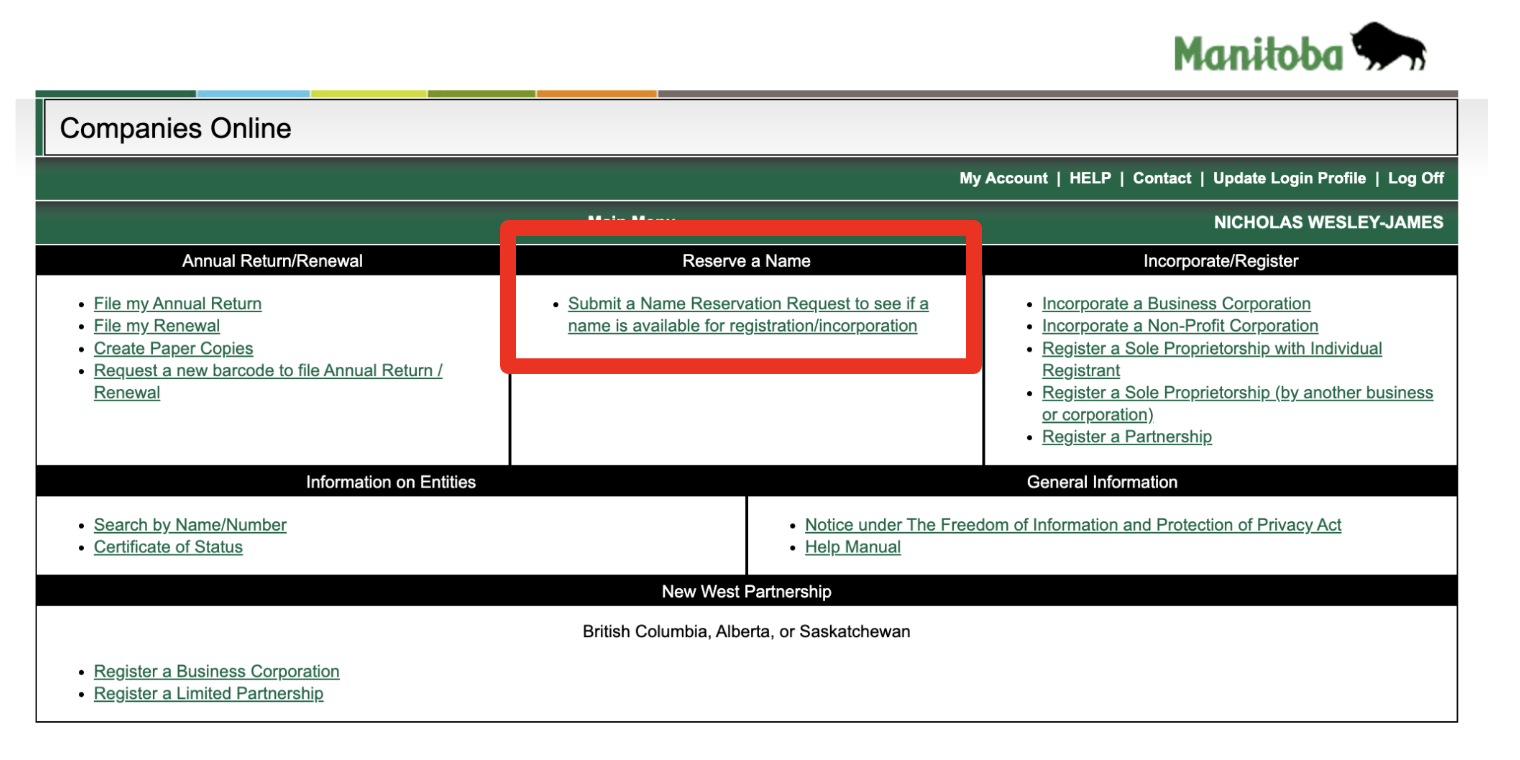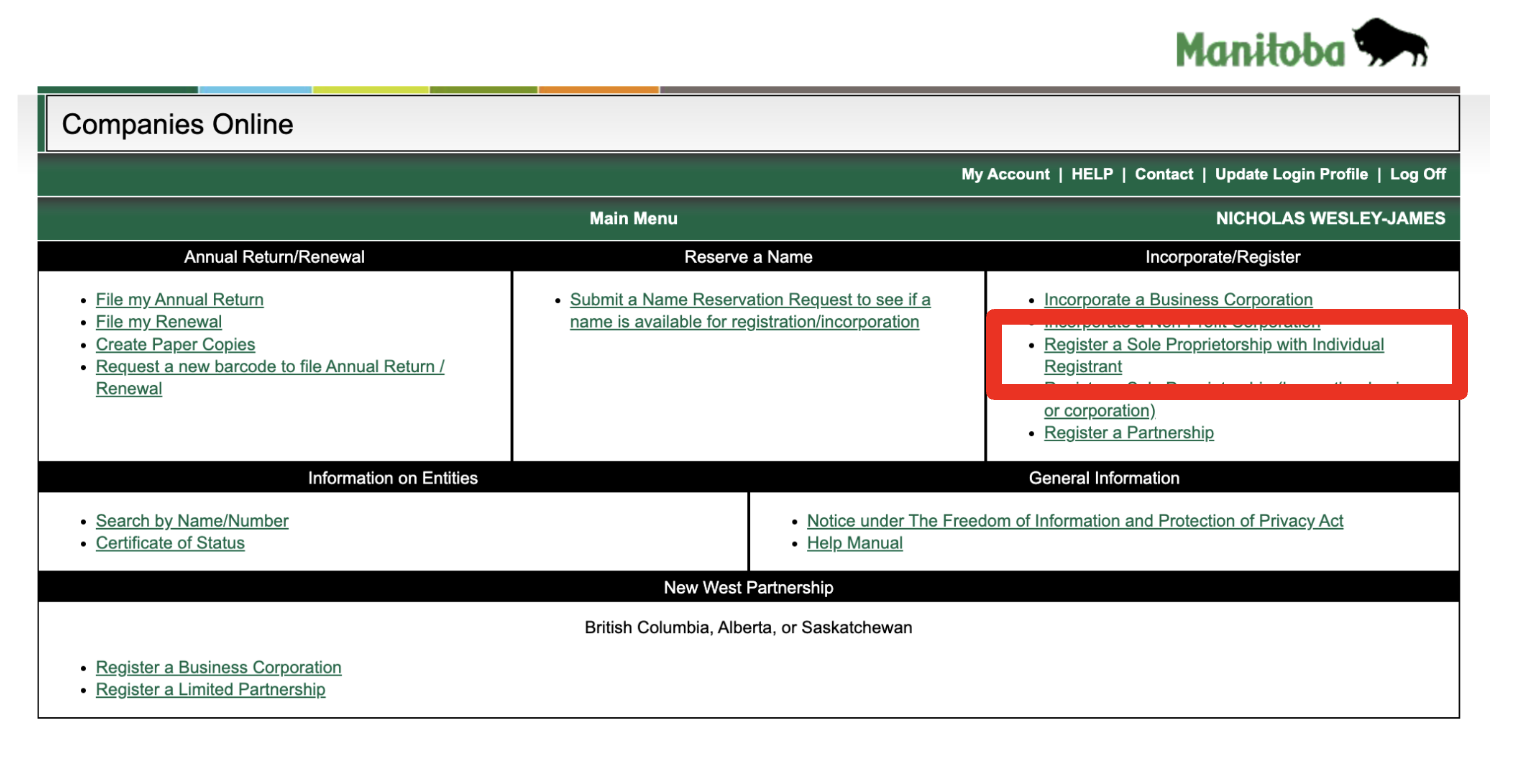Manitoba Business Registration (6 Step Detailed Guide)

Registering a business in Manitoba is a crucial step towards launching your entrepreneurial venture. Whether you're a sole proprietorship or a corporation, the process involves several steps and considerations to ensure your business complies with local regulations and operates smoothly. In this guide, we will walk you through the six essential steps to register a business in Manitoba, from understanding the necessity of registration to fulfilling ongoing compliance obligations.
Step 1 - Do You Need to Register Your Business?
Before going through the effort of registering your business, double check that you actually need to register. The Government of Manitoba is clear about the requirement to register a business in Manitoba. If your business operates in Manitoba and isn't a sole proprietorship under your own name, registration is necessary.
If you choose to carry on a business under a name other than your own name, you must register with the Companies Office. Sole proprietors who are carrying on business under their own name (ex: Jane Smith operating as “Smith Plumbing", does not have to register).
Note: the sole owner is required to display a sign at their business showing his or her full name. Partnerships and Corporations must be registered with the Companies Office.
Reference: Manitoba Companies Office
Step 2 - Choose the Right Manitoba Business Structure
The two most common business structures in Manitoba are sole proprietorship and corporation. Partnerships will not be the focus of this guide.
Different Business Structures in Manitoba
- Corporation (Manitoba)
- Corporation (Federal)
- Sole Proprietorship
- Partnership
One-time government fee: $350
Annual government fee: $65
Extra-Provincial Registration.Federal corporations with a headquarters in Manitoba must complete the extra-provincial registration process with the Companies Office.
One-time government fee: $200
One-time name fee: $13.80
Annual government fee: $12
Government Fee: $60 every 3 yearsOne-time name reservation fee: $45
Registration Fee (lasts for 3 years) $60
One-time name reservation fee: $45
Registration Fee (lasts for 3 years) $60
Pros and Cons of Different Business Structures
| Business Type | Setup Fees | Pros | Cons |
|---|---|---|---|
| Corporation | $$$ | Legal shield, easier to invest in, potential tax benefits | More complex, more expensive to set up and maintain |
| Sole Proprietorship | $ | Simple structure & reporting | No legal separation between the individual and the business |
| Partnership | $ | Can share costs between individuals | No legal shield, decisions require consensus between partners |
Illustrative Costs Associated With Each Business Structure
| Corporation | Sole Proprietorship | |
|---|---|---|
| One-time Government Name Search or Reservation Fee | Federal - $13.80 Manitoba - $45 | $45 |
| One-time Government Fee | Federal - $200 Manitoba - $350 | $60 |
| Annual Government Fee | Federal - $12 Manitoba - $65 | $60 fee paid once every 3 years |
| One-time Extra-Provincial Name Registration Fee | Federal - $45 Manitoba - N/A | N/A |
| One-time Extra-Provincial Registration Fee | Federal - $325 Manitoba - N/A | N/A |
| Annual Extra-Provincial Registration Fee | Federal - $65 Manitoba - N/A | N/A |
| Legal | Lawyer ($1000+ and $500+/year), Ribbon ($300+/year) | $0+ |
| Accounting | $1000+ for tax return preparation | $300+ for tax return preparation |
| Accounting Software | $0 to $700/year | $0 to $700/year |
| Payroll Software | $20/month + $3/employee | $20/month + $3/employee |
Disclaimer. These are ballpark numbers to give a sense, situation and requirements will dictate
Step 3a - Register a Sole Proprietorship in Manitoba
Registering as a Sole Proprietorship in Manitoba is quick and can be completed in minutes.
Steps to register a Sole Proprietorship:
- Search for name conflicts. Check for name conflicts for your proposed name using the Companies Online Search and the Canadian Trademarks Database.
Read the more detailed guide on Manitoba Business Names
- Submit a "Name Reservation Request". Through Companies Online submit a Name Reservation Request, part of this process will be a $45 fee.

- Register a sole proprietorship Through Companies Online register a sole proprietorship, part of this process will be a $60 fee.

Step 3b - Incorporate in Manitoba
Businesses can be incorporated in Manitoba as either a Federal Corporation or an Manitoba Corporation. There are some relatively minor differences but importantly both can sell across Canada and across the globe. This guide will cover federal corporations with Manitoba extra-provincial registration.
Federal Corporation with Manitoba Extra-Provincial Registration
Extra-provincial registration in Canada refers to the process of a business entity obtaining permission to operate in a province or territory other than the one in which it was initially incorporated.
Steps to Incorporate a Federal Corporation with Manitoba Extra-Provincial Registration:
- NUANS Name Search. Conduct a NUANS name search through the Corporations Canada portal. Cost is $13.80 and is completed almost immediately.
- Incorporate with Corporations Canada. Through the online portal, the same one you used for the NUANS Name Search, incorporate your business and pay a $200 fee. Corporations Canada provides recommended text you can use for items such as share classes, restrictions on share transfers, etc. Through the process you are required to sign the
Articles of IncorporationandInitial Registered Office Address and First Board of Directorsboth of which are generated for you. You must keep a signed copy of both these documents. - Manitoba Extra-Provincial Registration. Reserve a Manitoba Business Name using Companies Online. Note, name reservation not required for numbered companies. File the Application for Registration Form, pay the $350 fee. File the Power of Attorney unless the Registered Office Address is in Manitoba and there is a Director or Officer residing in Manitoba.
- Set Up Minute Book and Resolutions. Each corporation must maintain a minute book, which holds registers, ledgers, bylaws, resolutions, articles of incorporation, etc. Every corporation must also have the board of directors and shareholders issue certain resolutions relating to topics such as bylaws, appointing officers and directors, waiving of an auditor, etc. This step can get pretty confusing and it's recommended you hire legal/accounting advisors or use a service like Ribbon to do this for you.
Federal Corporations, compared to Manitoba Corporations, have higher legal name protection and can move their HQ between provinces. Manitoba Corporations have the benefit that they don't need to complete the extra-provincial registration process in Manitoba and are slightly cheaper.
Step 4 - Set Up Tax Accounts
Canada Revenue Agency Business Number. A business requires a Canada Revenue Agency Business Number if it is a corporation or if it needs a Canada Revenue Agency Account (GST/HST, Payroll Deductions, Import/Export). The Business Number is automatically assigned for corporations but sole-proprietorships need to apply for them.
Every Manitoba Corporation is automatically signed up for the Canada Revenue Agency Business Number. When filing a T2 Tax Return with the Canada Revenue Agency, the Manitoba provincial corporate tax is taken by the Canada Revenue Agency so a separate provincial income tax return is not required.
Goods and Service Tax/Harmonized Sales Tax (GST/HST) Account. If a business has sales of greater than $30,000 within the past 12 months it must register for a GST/HST account with the Canada Revenue Agency. Businesses that don't meet this mandatory threshold may still optionally register for the GST/HST account.
Retail Sales Tax (RST). If a business has taxable sales of $10,000 or more, they must register for the Manitoba RST. Read the more detailed Manitoba RST Guide Information Bulletin.
Payroll Account. If you have employees, and you hire them as employees not as contractors, you must register for a Payroll Account with the Canada Revenue Agency. Certain mandatory deductions such as Canada Pension Plan, Employment Insurance and Income Tax Deductions are remitted through the Payroll Account.
Step 5 - Obtain Licences and Permits
In general Manitoba is very business friendly, if you are ever uncertain of requirements you can call up a local government entity (city, township, etc.) and speak with a representative to clarify requirements for you to obtain the correct permit or licence.
BizPal is a great resource that makes it easy to search for the permits and licences you may need to start or grow your business
Step 6 - Stay Compliant - Annual and Ongoing Obligations of Manitoba Businesses
Sole Proprietorship Obligations
A sole proprietor must file a T1 Tax Return (Individual Tax Return) if the business:
- has to pay tax for the year;
- disposed of a capital property or had a taxable capital gain in the year;
- has to make Canada Pension Plan/Quebec Pension Plan (CPP/QPP) payments on self-employed earnings or pensionable earnings for the year;
- wants to access employment insurance (EI) special benefits for self-employed persons; or
- received a demand from the Canada Revenue Agency to file a return.
Reference - Canada Revenue Agency
Business Registry. Sole proprietorships must renew their registration with the Manitoba Companies Office once every 3 years.
The remainder of the sole proprietorship obligations depends on what tax accounts, permits and licences they have signed up for.
Corporation Obligations
Corporate obligations are more demanding than the sole proprietors
Key annual and ongoing obligations
- File an annual return with the relevant business registry
- File T2 return with the Canada Revenue Agency
- File relevant returns for Canada Revenue Agency Program Accounts (GST/HST, Payroll, Import/Export, etc.)
- File relevant provincial taxes
- Maintain a minute book
- Complete mandatory director and shareholder duties
- File relevant returns or file renewals for permits and licenses as applicable
Ribbon Makes Business Easy
To keep a corporation compliant is challenging. Ribbon gives entrepreneurs the tools to help them stay compliant. From setting up minute books, maintaining registers to annual filings, Ribbon let's Entrepreneurs focus on their business. Learn more about Ribbon or email support@getribbon.ai.
Conclusion
In conclusion, registering a business in Manitoba is a fundamental process that sets the foundation for your entrepreneurial journey in this province. By following the six steps outlined in this guide, you can navigate the intricacies of business registration, choose the right structure, and meet your tax and licensing obligations. Whether you opt for a sole proprietorship or a corporation, staying compliant with local regulations is vital for the long-term success of your business. Remember, there are resources and tools available to help you through this process.